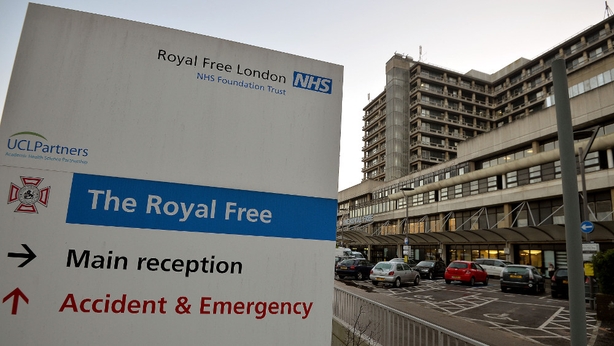A nurse being treated for Ebola in London could be given blood donations from fellow survivors in a bid to overcome the deadly virus, the Government's chief medical officer has said.
Pauline Cafferkey, a public health nurse at Blantyre Health Centre in South Lanarkshire, is receiving specialist treatment via a quarantine tent at the Royal Free Hospital in north London.
Chief medical officer Professor Dame Sally Davies said the experimental drug ZMapp, which was used to treat Mr Pooley, the nurse who was the first UK citizen to contract the disease, is "not available at the moment".
Among options of alternative treatment she said: "We do have available a small amount of convalescent plasma. Plasma is the liquid of blood and convalescent is the recovery phase.
"The theory is as we fight off infections we make anti-bodies and if you harvest the plasma you get a source of antibodies that you can put in to someone and you'd expect it to work.
"But the cornerstone of treatment remains fluid and electrolyte treatment."
She said the course of treatment would be discussed privately between the 39-year-old patient and her clinician.
Scotland's First Minister Nicola Sturgeon said Mrs Cafferkey is "doing as well as can be expected in the circumstances".

The nurse, from Glasgow, was part of a 30-strong team of medical volunteers deployed to Africa by the British government last month and had been working with Save the Children at the Ebola Treatment Centre in Kerry Town, Sierra Leone.
She was initially placed in isolation at a Glasgow hospital early yesterday after feeling feverish, before being transferred south on an RAF C-130 Hercules plane.
The healthcare worker had flown from Sierra Leone via Morocco to Heathrow Airport where she was considered a high risk because of the nature of her work and showed no symptoms during screening and a temperature check.
While waiting for a connecting flight to Glasgow she raised fears about her temperature and was tested a further six times in the space of 30 minutes.
But after being given the all clear she flew on to Scotland and took a taxi to her home where she later developed a fever and raised the alarm.
Dame Sally Davies said questions have been raised about the airport screening procedure, but insisted the screening was designed to raise public awareness about the virus and was not expected to detect every case of Ebola.
She said: "She was cleared to travel because she didn't have Ebola symptoms including a raised temperature.
"It does raise a question whether we should be more precautionary. The risk of raised temperature when she came back appears to have been very low.
"That's why we look at what we do all the time to see should we have been more precautionary, is it in the public's interest? Is it in the patient's interest?
"I doubt it would have made much difference."
At a press conference today she added that she was not aware of reports that Mrs Cafferkey may have attended a Christmas Day church service ahead of her return to the UK, but said a review in to how she contracted the disease will be carried out by the Department for International Development and Save the Children.
Colleague Dr Martin Deahl, who sat next to the nurse on the flight to Heathrow as they returned from five weeks in Sierra Leone, has criticised the procedures in place for testing returning health workers as "disorganised".
The NHS said 48 volunteer health professionals remain in Sierra Leone helping the thousands of sufferers while a further 1,500 have returned or are preparing to go in stages.
Health Protection England and Health Protection Scotland are continuing to trace passengers on the flights Mrs Cafferkey took back to Heathrow via Casablanca in Morocco and her onward journey to Glasgow Airport, where she arrived at about 11.30pm on Sunday on a British Airways flight.
Dr Paul Cosford, head of the Health Protection Agency, said around a third of the 133 passengers on board the flight between Morocco and the UK have been contacted while messages have been given to more than half of the 72 travelling between Heathrow and Glasgow.
They have been urged to carefully watch for symptoms of Ebola and given advice on what to do if they present with signs of the virus.
However, he stressed that even passengers who came in to contact with Mrs Cafferkey were at extremely low risk.
Ebola is not an airborne disease and can only be contracted through contact with bodily fluids including diarrhoea, vomit and blood.
Mrs Cafferkey is the second Briton to test positive and the first to do so on UK soil after nurse Mr Pooley, 29, contracted Ebola while volunteering in Sierra Leone in August before getting the all-clear following treatment at the Royal Free Hospital.

